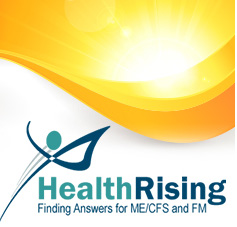There may be a concentration thing going on here because if I got an IV of just fluids and electrolytes, this went away.
I was not aware of this. I don't know if it is common.
But there may be logic to it.
One of the ways I see this 2,3-Bisphosphoglycerate supply going low in ME/FM/... is by RBC being "hampered and temporary unable to move on" in the finer capillaries. So they are stuck for a longer then normal time there. That wouldn't be that surprising as we appear to have inflexible RBC, who can flow poorly through smaller capillaries.
There are also (mixed) reports on these smallest capillaries being narrowed quite a bit in ME/FM/...
Also, having low blood volume "hits" the smallest capillaries more then the bigger blood vessels. That is, when the speed of blood flow decreases, blood becomes increasingly viscous (meaning it flows worse and worse and becomes more thick). In that aspect it's worse then water. I've written on that before.
So IV saline does possibly three things here:
1) It increases (temporary) the blood volume. That makes the smallest capillaries being "less hit" by very poor blood flow.
2) It (temporary) decreases the ratio of RBC to total blood volume quite a bit. Higher RBC content per volume makes blood flow worse so diluting it should make it flow better. With it, sort of an anemic condition is created but if "somehow" this would up 2,3-Bisphosphoglycerate then this may more then compensate for it. Remember: our bodies are already "tuned" to live under low oxygen conditions and hibernating to save oxygen.
3) The (temporary) increased blood volumes may increase blood pressure or pressure fall over the capillaries. That could "push them a bit open" although this may be a minor effect.
Getting back to the "somehow" in 2):
If RBC get stuck too long in the smallest capillaries then they will block the blood flow near completely over there. Unflexible round RBC are often bigger then the diameter of these vessels so if one is stuck you have a sort of a stuck traffic jam.
But the tissue still needs oxygen. So these RBC will slowly give away their oxygen. Remember: 2,3-Bisphosphoglycerate is mainly stored in the RBC themselves. Having more of this chemical does increase the release
speed of oxygen. Having less of this chemical does decrease the release
speed of oxygen.
So when RBC can take the "quick" route through broad blood vessels, our RBC with according to me few of this chemical will have released few oxygen. But if the RBC take the very slow route through our very narrow RBC then they still will have released a (very) high percentage of their oxygen.
Compare it a bit with a truck spraying salt on icy roads to deice them. Compare the RBC of healthy people to a salt truck with a spraying arm with big holes in it. Compare the RBC of ME/FM/... people to a salt truck with a spraying arm with small holes in it.
When both drive at high speed over the highway spraying salt, the first one will release enough salt and have few left at the end of the highway. The "ill" one will release few salt along the road and return near full at the end of the highway.
Now let them drive really slowly along an equal length "slow speed" road with the exact same "spraying settings". The "healthy" one will completely run out of salt before being halfway as it releases salt per minute, not per kilometer driven (in the case the spray arm is noting more then a hole at the end of the truck). The "ill" one on the other hand will be able to deice the entire small road properly. And it likely will still have some salt left at the end of the road.
You could oversimplify this in a way and say that our RBC are "chemically tuned" by decreasing the 2,3-Bisphosphoglycerate content in them for "poor road conditions allowing only slow travel".
Translated to ME: the RBC may be tuned to remain somewhat more functional for operating under conditions of high oxidative stress (unflexible RBC that have trouble squeezing themselves through the smallest capillaries) and plenty of "rubble on the road" like inflammatory damage, lesions, NETs for trapping pathogens, broken down pathogens and body cells...
So this mechanism may tell something about the underlying problem. Constant IV saline supply unlikely solves this problem long term, at least not in random doses and intervals.
I hope it's a bit more clear what I try to explain. Keep in mind it is quite a big oversimplification. But it gives an overview of how things might work out here.

For example, when the RBC "get stuck in this traffic jam", they'll likely easily run out of energy. And this 2,3-Bisphosphoglycerate buffer in the RBC offers some extra fuel for glycolysis for them to produce ATP for the RBC themselves. So "traffic jams" sort of self regulate the adequate amount of 2,3-Bisphosphoglycerate in the RBC to an extend. But this is a fairly crude mechanism so things like pregnancy and hyperthyroidism may affect it *sometimes* for the better (with regards to breathing).
BTW: we both appreciate the appreciation

















